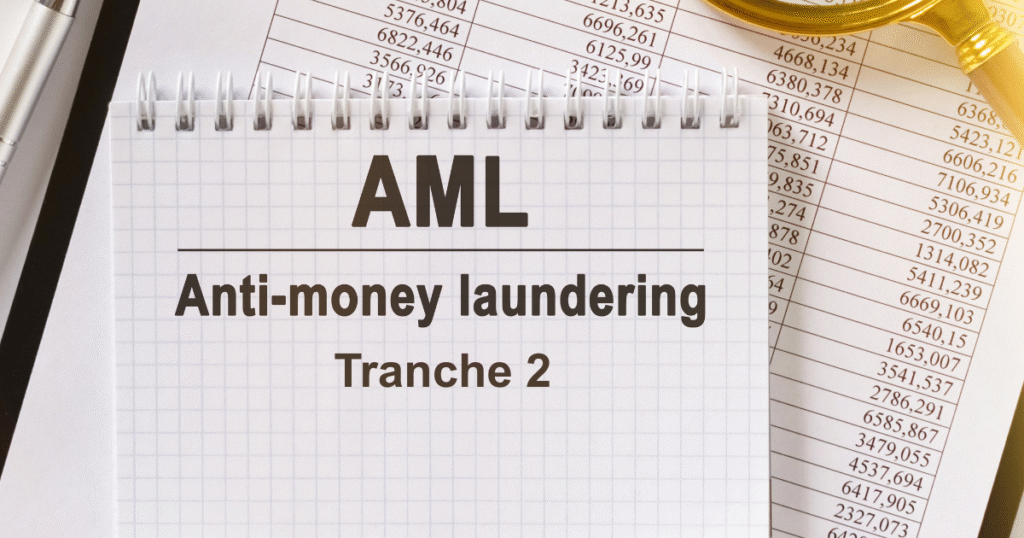Introduction
Australia’s anti-money laundering and counter-terrorism financing (AML/CTF) regime is undergoing a significant expansion, with new Tranche 2 obligations set to apply to real estate agents, lawyers, and conveyancers from 1 July 2026. These reforms aim to combat financial crime by regulating high-risk sectors, thereby strengthening the integrity of the Australian financial system against money laundering and terrorism financing.
For real estate professionals, a critical question arising from these changes is whether they can rely on the customer due diligence conducted by conveyancers to streamline compliance and avoid duplicative efforts in a property transaction. This guide explores the current draft proposals that address this issue, explains the concept of “reasonable reliance” under the AML/CTF framework, and outlines the implications for Australian real estate agents navigating this period of regulatory uncertainty.
Proposed AML Changes for Relying on Conveyancers
Understanding the Draft Rules on Cross-Sector Reliance
The Second Exposure Draft of the AML/CTF Rules, released in May 2025, introduces a significant proposal for cross-sector collaboration. At its core, the draft framework would formally permit Australian real estate agents to rely on the customer due diligence (CDD) and Know Your Customer (KYC) work performed by conveyancers and lawyers involved in the same property transaction.
This change is designed to prevent the duplication of compliance efforts, removing the need for both parties to conduct identical, separate checks on the same individuals.
A key feature of these proposed updates is more flexible timing. Under the draft rules:
- Both real estate agents and conveyancers would be allowed to delay the initial CDD on purchasers until just before settlement
- This practical adjustment better aligns the compliance process with the natural workflow of a real estate transaction
However, these provisions are part of a draft proposal and are not yet settled law, pending further consultation and finalisation by AUSTRAC.
Benefits for the Real Estate: Reduced Costs & Duplication
The Australian real estate industry and compliance experts have broadly welcomed the proposed changes. Industry bodies, most notably the Real Estate Institute of Australia (REIA), have praised the draft rules for incorporating feedback that addresses the practical challenges of the new regime.
The ability for real estate agents to rely on the due diligence conducted by conveyancers is considered a significant step forward. The primary benefits highlighted by industry leaders include:
| Benefit | Description / Industry Comment |
|---|---|
| Reduced Administrative Burden | REIA CEO Scott Rollason has stated that the changes will significantly reduce the administrative tasks and associated compliance costs for sellers and their agents. |
| Eliminating Duplication | The new rules would remove the need to “double up” on obtaining reports and conducting KYC checks, streamlining the entire process for a more efficient transaction. |
| Increased Practicality | Experts like Neil Jeans, a risk consulting partner at Grant Thornton, have noted that the proposals provide much-needed clarity and a more practical approach to anti-money laundering compliance within the property sector. |
Get Your Free Initial Consultation
Request a Free Consultation with one of our experienced AML Lawyers today.
What Reasonable Reliance Means for Real Estate Agents
Ongoing CDD Arrangements vs. Case-by-Case Reliance
Under the proposed Tranche 2 reforms, the draft AML/CTF rules outline two distinct legal mechanisms for how real estate agents can rely on the CDD performed by conveyancers. These options provide different levels of protection and require different operational approaches.
The first and more structured option is an Ongoing CDD Arrangement. This involves:
| Feature | Ongoing CDD Arrangement | Case-by-Case Reliance |
|---|---|---|
| Nature of Agreement | A formal, written agreement defining the responsibilities of each party. | An ad-hoc assessment for a single transaction without a formal ongoing agreement. |
| Core Requirement | Agent must have “reasonable grounds to believe” the conveyancer has adequate AML systems and controls. | Agent must document why reliance was appropriate for the specific transaction based on ML/TF risks. |
| Legal Protection | Provides a “safe harbour,” which can legally shield the agent from penalties for isolated compliance breaches by the conveyancer. | Offers no “safe harbour” protection. |
| Liability | The agent ultimately remains liable but is protected from isolated breaches. | The real estate agent remains fully liable for any violations of identification procedures. |
The second, more flexible option is Case-by-Case Reliance. This ad-hoc approach allows an agent to rely on a conveyancer’s due diligence for a single transaction without a formal ongoing agreement. However, this method carries greater risk as it offers no “safe harbour” protection, meaning the real estate agent remains fully liable for any breaches of identification procedures.
The Agent’s Responsibility & Ultimate Legal Liability
Real estate agents must understand that relying on a conveyancer’s due diligence does not transfer legal responsibility. The agent remains legally liable for meeting their AML/CTF obligations as the reporting entity.
If the due diligence performed by the conveyancer is later found to be deficient or non-compliant, the agent can still face significant penalties from AUSTRAC.
This non-transferable liability means that “reasonable reliance” is an active process, not a passive one. Agents cannot simply assume a conveyancer’s work is adequate; they must conduct due diligence on their partners to ensure their AML/CTF programs are robust.
Furthermore, an agent must still apply their risk-based assessment to every transaction. If an agent evaluates a client’s risk profile more than the conveyancer’s, they may need enhanced due diligence.
Current Uncertainties & The Path to Final AML Rules
The Provisional Status of the Draft AML Rules
Australian real estate agents and conveyancers must understand that the proposed changes allowing reliance on third-party due diligence are not yet law. The provisions are part of a second exposure draft of the AML/CTF Rules released in May 2025.
This framework remains provisional and is subject to change following a closed consultation period in June 2025. While the move towards permitting reliance is a significant development welcomed by the real estate industry, it is not a settled fact.
A period of uncertainty will continue until AUSTRAC publishes the final rules and supporting materials. Agents must not assume they can legally rely on a conveyancer’s CDD until the new regime is officially confirmed and implemented.
Key Compliance Dates & Deadlines
To navigate the transition, real estate agents should be aware of the key milestones leading up to the commencement of the new obligations. The path to finalisation involves several important dates that will provide increasing clarity on the compliance requirements for the real estate industry.
The timeline for the finalisation and implementation of the Tranche 2 reforms includes:
| Date | Expected Milestone / Event |
|---|---|
| August 2025 | AUSTRAC is expected to publish the final, legally binding AML/CTF Rules, confirming the structure of reliance provisions. |
| December 2025 | The release of industry-specific guidance and Small Business Starter Kits is scheduled, offering practical “how-to” instructions. |
| 1 July 2026 | The new AML/CTF obligations for Tranche 2 entities, including real estate agents and conveyancers, will officially commence. |
Get Your Free Initial Consultation
Request a Free Consultation with one of our experienced AML Lawyers today.
Practical Steps for Australian Real Estate Agents & Conveyancers
How to Prepare for the New Regime Before July 2026
With the new AML/CTF obligations commencing 1 July 2026, proactive preparation is essential for Australian real estate agents. Even with the final rules pending, agencies can take numerous practical steps to build a strong compliance foundation and prepare for the introduction of third-party reliance.
A strategic approach to preparing for the Tranche 2 reforms should include:
| Preparatory Step | Description / Action Required |
|---|---|
| Educate Your Team | Understand the draft rules and core obligations using resources from AUSTRAC and industry bodies like the Law Society of NSW. Appoint a compliance champion to lead the project. |
| Conduct a Preliminary Risk Assessment | Analyse your business to identify potential ML/TF risks, considering factors such as: Your typical client base The types of properties you sell Complex ownership structures (trusts, overseas clients) |
| Review Systems and Budget | Evaluate if the current CRM, trust accounting software, and record-keeping processes are adequate. Budget for new costs, which may include: Specialised software Staff training Expert legal advice |
| Engage with Conveyancing Partners | Start a dialogue with conveyancers and law firms to assess their understanding of the new obligations and their willingness to enter into formal reliance agreements. |
| Develop a Draft AML/CTF Program | Begin outlining your AML/CTF program based on your risk assessment and available draft guidance, ready for refinement when final rules are published. |
Understanding the Risks of Third-Party Reliance
While the ability to rely on a conveyancer’s CDD is designed to reduce duplication, it does not eliminate risk for real estate agents. It is critical to understand that reliance is not a transfer of legal responsibility, and the agent remains ultimately accountable for their compliance.
Several key risks are associated with third-party reliance, even when the rules formally permit it:
| Risk Type | Explanation |
|---|---|
| Compliance Risk | The agent remains legally liable for any breaches. Relying on a non-compliant conveyancer can lead to severe penalties from AUSTRAC, as the “safe harbour” provision only covers isolated breaches, not systemic failures. |
| Reputational Risk | Association with a conveyancing partner who fails in compliance can damage your agency’s brand and client trust if a transaction is linked to money laundering. |
| Operational Risk | Reliance on a partner can hinder your compliance. For example, a conveyancer’s delay in providing KYC documents could cause transaction delays and place you in breach of AML/CTF timing requirements. |
Get Your Free Initial Consultation
Request a Free Consultation with one of our experienced AML Lawyers today.
Conclusion
The upcoming Tranche 2 AML/CTF reforms, effective from 1 July 2026, propose allowing Australian real estate agents to rely on CDD performed by conveyancers, though this is not yet settled law. While this offers a path to reduce duplication, agents must understand that reliance requires diligent preparation and does not transfer their ultimate legal liability for compliance.
To navigate these complex changes and ensure your agency is prepared, contact the AML House experts today. Our expert AML compliance services can help ensure your real estate agency is 100% compliance with AML/CTF laws, providing you with the trusted expertise needed to achieve peace of mind.
Frequently Asked Questions (FAQs)
You cannot start relying on your conveyancer’s KYC checks today because the rules permitting this are still in draft form and not yet law. Conveyancers will only become regulated “reporting entities” with full AML/CTF obligations on 1 July 2026.
No, relying on a conveyancer does not transfer your legal liability to them. The real estate agent remains legally responsible for meeting their AML/CTF obligations.
An ongoing CDD arrangement is a formal, written agreement that provides a “safe harbour” from penalties for isolated breaches, while case-by-case reliance is an informal assessment for a single transaction that offers no such protection. With case-by-case reliance, the agent remains fully liable for any compliance failures.
If a conveyancer refuses to share their KYC documents, reliance cannot proceed, and the agent must perform their own CDD. The ability to access verification documents promptly upon request is a mandatory condition for any reliance arrangement.
The final AML/CTF Rules will be published in August 2025. However, more detailed, industry-specific guidance and Small Business Starter Kits from AUSTRAC are scheduled for release in December 2025.
Yes, the new AML/CTF obligations will require real estate professionals to conduct CDD on both buyers and sellers involved in a transaction. The draft rules propose allowing the due diligence on purchasers to be delayed until just before settlement.
The “safe harbour” provision is a legal protection that shields a real estate agent from penalties for an isolated compliance breach made by a conveyancer they rely on. This protection is only available when a formal, written, Ongoing CDD Arrangement is in place and does not cover systemic failures.
Your real estate agency should prepare now by educating your team on the draft rules, conducting a preliminary risk assessment of your business, and starting a dialogue with your conveyancing partners. It is also wise to begin planning for formal reliance agreements and monitoring updates from AUSTRAC.
Based on the current proposals, the Tranche 2 AML/CTF changes do not apply to property management or leasing services. The obligations are focused on the services related to selling, purchasing, or transferring real estate.








